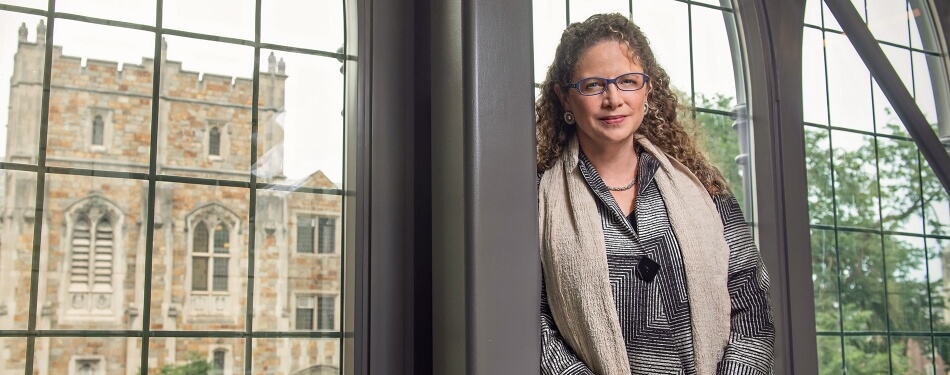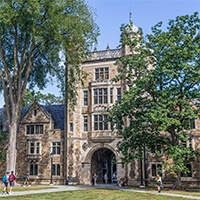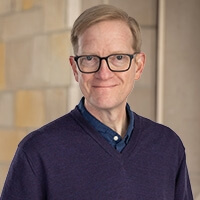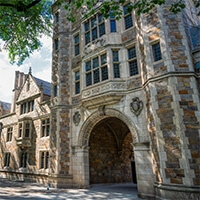Professor Karima Bennoune, ’94, was elected to serve as a vice president of the American Society of International Law (ASIL) during its 2025 annual meeting in April. She also was chosen to co-lead the 2026 annual meeting.
Bennoune, the Lewis M. Simes Professor of Law, specializes in public international law and international human rights law, including issues related to culture, extremism and terrorism, and women’s human rights.
“I should start by saying how grateful I am to the American Society of International Law generally,” said Bennoune. “I first attended its annual meeting when I was a Michigan Law student. As a third-culture kid who lived her life across borders, a career in the field of international law was my dream back then, and the Society has done so much to enable this dream through its substantive programs and the networking opportunities it affords.”
As vice president, Bennoune sees a chance to pay it forward.
“My primary goal as VP will be to work alongside my outstanding fellow officers and the Society’s dynamic membership to do everything I can to ensure ASIL has the strongest possible capacity to continue supporting new generations of 21st-century international lawyers.”
In 2024, Bennoune received ASIL’s Prominent Woman in International Law Award, in part for her leadership in the international movement to formally recognize the situation in Afghanistan as “gender apartheid.”
Since 2018, she has been a member of the board of editors of the American Journal of International Law. A former legal adviser for Amnesty International, she has carried out human rights missions in most regions of the world.
Bennoune served as the UN special rapporteur in the field of cultural rights from 2015 to 2021. She also was appointed as an expert for the International Criminal Court in 2017 during the reparations phase of the groundbreaking case The Prosecutor v. Ahmad Al Faqi Al Mahdi, which concerned the intentional destruction of cultural heritage sites in Mali.
Continuing Michigan Law’s legacy of international engagement
Bennoune’s elevation to the vice presidency is the latest chapter in the Law School’s long history of leadership within the organization and its journal, the American Journal of International Law (AJIL).
William W. Bishop Jr., ’31, the Edwin DeWitt Dickinson Professor of Law Emeritus, served as editor in chief of AJIL and was vice president and an honorary president of ASIL.
Eric Stein, the Hessel E. Yntema Professor of Law Emeritus, was an honorary vice president of ASIL and an honorary editor of, and frequent contributor to, AJIL. He received ASIL’s Manley O. Hudson Award for his lifetime of significant contributions to international and comparative law in 2011.
Two years later, Professor Brunno Simma received the Hudson Award for his work as co-founder and editor of the European Journal of International Law and co-founder of the European Society of International Law.
More recently, Professor Julian Arato, the director of the Center for International and Comparative Law and the Program on Law and the Global Economy, co-chaired ASIL’s 2024 annual meeting. He is a member of the board of editors of AJIL.
“Karima embodies the Law School’s enduring leadership in international and comparative law. She is truly visionary in thinking about global human rights, particularly related to women, and it is wonderful that the American Society of International Law recognizes this by elevating her to the vice presidency,” said Kyle Logue, interim dean of the Law School and the Douglas A. Khan Collegiate Professor of Law.
“We at the Law School are proud to call her one of our own, as an alumna and as a faculty colleague.”
ASIL’s work is “absolutely vital”
With ongoing global conflicts, existential threats such as climate change, and regime changes that cast uncertainty on alliances, trade relationships, travel across borders, and more, Bennoune says ASIL’s work remains extremely important.
She notes that ASIL’s constitution states the goals of the organization as being “to foster the study of international law and to promote the establishment and maintenance of international relations on the basis of law and justice,” which leads ASIL to cooperate with similar bodies around the world, such as the Canadian Council on International Law.
“That means that both the topics the Society focuses on and the ways it works on them are inherently transnational, bringing together experts to analyze leading global challenges and help to identify solutions,” Bennoune said.
“ASIL has maintained its commitment to these goals,” she continued. “In recent years, it has brought a wider array of voices into these conversations, from all regions of the world, from many different backgrounds, and even from across disciplinary boundaries. My term as VP coincides with a crucial moment for emphasizing the Society’s first principles. Promoting the international rule of law is absolutely vital in 2025.”
Looking ahead to the 2026 annual meeting, Bennoune said the planning work will begin in the coming days.
“I look forward to curating a truly global gathering of international lawyers, despite contemporary challenges, and to ensuring that the meeting meets the moment.”
About ASIL
The American Society of International Law (ASIL) is a nonprofit, nonpartisan, educational membership organization founded in 1906 and chartered by Congress in 1950. ASIL holds Special Consultative Status to the Economic and Social Council of the United Nations and is a constituent society of the American Council of Learned Societies.
The Society is headquartered in Washington, DC, and its members from more than 100 nations include attorneys, academics, corporate counsel, judges, representatives of governments and non-governmental organizations, international civil servants, students, and others interested in international law.







